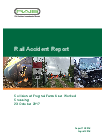Since the announcement of the merger on 30 April, the Competition and Markets Authority (CMA) has been gathering the information needed to start its formal investigation. It will now begin the first phase (known as Phase 1) of its detailed assessment into how the deal could affect competition for UK shoppers.
The CMA’s investigation will consider whether the deal could lead to less choice, and therefore higher prices or worse quality services, across the range of products sold by both businesses. As well as being major retailers of groceries, both in-store and online, Sainsbury’s and Asda also compete to sell goods such as fuel, electricals, toys and clothing.
The CMA will also look at whether the merged company could use its increased buyer power to squeeze suppliers and whether this could have potential knock-on effects for shoppers – for example, through suppliers being less able to innovate or having to charge higher prices to stores that compete with the merged company.
Andrea Coscelli, chief executive of the CMA, said:
About £190 billion is spent each year on food and groceries in the UK so it’s vital to find out if the millions of people who shop in supermarkets could lose out as a result of this deal.
We will carry out a thorough investigation to find out if this merger could lead to higher prices or a worse quality of service for shoppers and will not allow it to go ahead unless any concerns we find are fully dealt with.
Sainsbury’s and Asda have asked the CMA to move more quickly to the in-depth (Phase 2) part of the inquiry through a ‘fast-track’ process.
In most merger cases, a full Phase 1 investigation is needed to determine whether a deal can be cleared or whether further scrutiny is required. However, merging companies can ask for the CMA’s review of the deal to be moved more quickly to Phase 2 where it is clear from an early stage that the deal requires an in-depth investigation.
The CMA expects to accept this request unless it receives any valid objections to the use of the fast-track process.
The CMA is now inviting views by 31 August on how the merger could affect competition. This follows the preliminary invitation to comment launched at the start of the information gathering period. Further opportunities to submit views will also be provided during the Phase 2 investigation.
All information relating to the investigation is available on the Sainsbury’s / Asda page.
Notes to Editors
- The CMA is the UK’s primary competition and consumer authority. It is an independent non-ministerial government department with responsibility for carrying out investigations into mergers, markets and the regulated industries and enforcing competition and consumer law. For CMA updates, follow us on Twitter, Facebook, and LinkedIn.
- Under the Enterprise Act 2002 (the Act) the CMA has a duty to make a reference to Phase 2 if the CMA believes that it is or may be the case that a relevant merger situation has been created, or arrangements are in progress or in contemplation which, if carried into effect, will result in the creation of a relevant merger situation; and the creation of that situation has resulted, or may be expected to result, in a substantial lessening of competition within any market or markets in the United Kingdom for goods or services.
- Media enquiries to the CMA should be directed to press@cma.gov.uk or 020 3738 6460.
Link: Press release: CMA launches Sainsbury’s / Asda merger investigation
Source: Gov Press Releases




